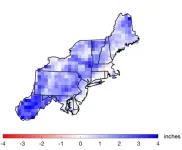(Press-News.org) University of Cambridge media release
UNDER STRICT EMBARGO UNTIL 00:01AM (UK TIME) ON WEDNESDAY 31ST MAY 2023
An unprecedented record of medieval live comedy performance has been identified in a 15th-century manuscript. Raucous texts – mocking kings, priests and peasants; encouraging audiences to get drunk; and shocking them with slapstick – shed new light on Britain’s famous sense of humour and the role played by minstrels in medieval society.
The texts contain the earliest recorded use of ‘red herring’ in English, extremely rare forms of medieval literature, as well as a killer rabbit worthy of Monty Python. The discovery changes the way we should think about English comic culture between Chaucer and Shakespeare.
Throughout the Middle Ages, minstrels travelled between fairs, taverns and baronial halls to entertain people with songs and stories. Fictional minstrels are common in medieval literature but references to real-life performers are rare and fleeting. We have first names, payments, instruments played and occasionally locations, but until now virtually no evidence of their lives or work.
Dr James Wade, from Cambridge University’s English Faculty and Girton College, came across the texts by accident while researching in the National Library of Scotland. He then had a “moment of epiphany” when he noticed the scribe had written: ‘By me, Richard Heege, because I was at that feast and did not have a drink.’
“It was an intriguing display of humour and it’s rare for medieval scribes to share that much of their character,” Wade says. That made him investigate how, where and why Heege had copied out the texts.
Wade’s study, published today in The Review of English Studies, focuses on the first of nine miscellaneous booklets in the ‘Heege Manuscript’. This booklet contains three texts and Wade concludes that around 1480 Heege copied them from a now lost memory-aid written by an unknown minstrel performing near the Derbyshire-Nottinghamshire border. The three texts comprise a tail-rhyme burlesque romance entitled The Hunting of the Hare; a mock sermon in prose; and The Battle of Brackonwet, an alliterative nonsense verse.
“Most medieval poetry, song and storytelling has been lost”, Wade says. “Manuscripts often preserve relics of high art. This is something else. It’s mad and offensive, but just as valuable. Stand-up comedy has always involved taking risks and these texts are risky! They poke fun at everyone, high and low.”
The booklet’s secrets have been hiding in plain sight because, Wade believes, previous study has focused on how the manuscript was made and overlooked its comedic significance.
Wade connected multiple clues pointing to a minstrel’s repertoire. All three texts are humorous and designed for live performance – the narrator tells his audience to pay attention and pass him a drink. The texts all feature in-jokes to appeal to local audiences and show a playful awareness of the kind of diverse, celebrating audiences that we know minstrels performed to.
Wade thinks the minstrel wrote part of his act down because its many nonsense sequences would have been extremely difficult to recall. “He didn’t give himself the kind of repetition or story trajectory which would have made things simpler to remember,” Wade says.
“Here we have a self-made entertainer with very little education creating really original, ironic material. To get an insight into someone like that from this period is incredibly rare and exciting.”
Many minstrels are thought to have had day jobs, including as ploughmen and peddlers, but went gigging at night and weekends. Some may have travelled across the country, while others stuck to a circuit of local venues as Wade thinks this one did.
Wade says: “You can find echoes of this minstrel’s humour in shows like Mock the Week, situational comedies and slapstick. The self-irony and making audiences the butt of the joke are still very characteristic of British stand-up comedy.”
The texts add to what we thought minstrels did. Fictional depictions suggest they performed ballads about Robin Hood, chivalric romances, adventure stories and songs about great battles.
“These texts are far more comedic and they serve up everything from the satirical, ironic, and nonsensical to the topical, interactive and meta-comedic. It’s a comedy feast,” Wade says.
Killer rabbit
The Hunting of the Hare is a poem about peasants which is full of jokes and absurd high jinks. The poem features fictional peasants including Davé of the Dale and Jack Wade, who could be from any medieval village. One scene is reminiscent of Monty Python’s ‘Killer Rabbit of Caerbannog’:
Jack Wade was never so sad / As when the hare trod on his head / In case she would have ripped out his throat.
Dr Wade says: “Killer rabbit jokes have a long tradition in medieval literature. Chaucer did this a century earlier in the Canterbury Tales.”
Boozy sermon
The texts include one of the few surviving examples of a mock sermon in Middle English, the most famous being Chaucer’s Wife of Bath’s Prologue. This example comically addresses its audience as ‘cursed creatures’ and embeds fragments of drinking songs, including:
“Drink you to me and I to you and hold your cup up high” and “God loves neither horse nor mare, but merry men that in the cup can stare.”
Wade explains: “This is a minstrel telling his audience, perhaps people of very different social standing, to get drunk and be merry with each other.”
Earliest ‘red herring’
The mock sermon ridicules the aristocracy, and in doing so makes the earliest recorded use of ‘red herring’ to mean a diversion.
Three kings eat so much that 24 oxen burst out of their bellies sword fighting. The oxen chop each other up so much that they are reduced to three ‘red herrings’.
Dr Wade says: “The images are bizarre but the minstrel must have known people would get this red herring reference. Kings are reduced to mere distractions. What are kings good for? Gluttony. And what is the result of gluttony? Absurd pageantry creating distractions, ‘red herrings’.”
Robin Hood and jousting bears
‘The Battle of Brakonwet’ is an alliterative nonsense verse, which is extremely rare in Middle English.
The text features Robin Hood as well as jousting bears, battling bumblebees and partying pigs. The poem names several villages close to the Derbyshire-Nottinghamshire border and so invites audiences to imagine absurd incidents happening in their neighbourhood.
The poem includes a skilful demonstration of alliterative verse and a clever double entendre in the line: ‘In a slommuryng of slepe, for-slokond with ale’. ‘For-slokond; could mean both ‘quenched’ and ‘drenched’.
Wade says: “We shouldn’t assume that popular entertainers weren’t capable of poetic achievement. This minstrel clearly was.”
The scribe
Richard Heege was a household cleric and tutor to the Sherbrooke family, part of the Derbyshire gentry, to whom his booklets first belonged. Heege appears to have had a sense of humour and a penchant for literature which others may have thought too lowbrow to preserve in manuscript.
“Heege gives us the rarest glimpse of a medieval world rich in oral storytelling and popular entertainments,” says Wade.
Minstrels and medieval life
When this minstrel was performing, the Wars of the Roses were still being fought and life was hard for most people in England. But, Wade says, “These texts remind us that festive entertainment was flourishing at a time of growing social mobility.”
“People back then partied a lot more than we do today, so minstrels had plenty of opportunities to perform. They were really important figures in people’s lives right across the social hierarchy. These texts give us a snapshot of medieval life being lived well.”
There could be more evidence to be found but Wade emphasises that minstrel writing is unlikely to have survived and that we should look for other kinds of evidence, like Hegge’s texts, which provide a valuable witness to live performances.
Reference
J. Wade, ‘Entertainments from a medieval minstrel’s repertoire book’, The Review of English Studies (2023). DOI: 10.1093/res/hgad053
END
Unique “bawdy bard” act discovered, revealing 15th-century roots of British comedy
2023-05-31
ELSE PRESS RELEASES FROM THIS DATE:
Saved from extinction, Southern California’s Channel Island Foxes now face new threat to survival
2023-05-31
Tiny foxes — each no bigger than a five-pound housecat — inhabiting the Channel Islands off the coast of Southern California were saved from extinction in 2016. However, new research reveals that the foxes now face a different threat to their survival.
Suzanne Edmands, professor of biological sciences at USC Dornsife College of Letters, Arts and Sciences, and Nicole Adams, who earned her PhD from USC Dornsife in 2019, found that the foxes’ genetic diversity has decreased over time, possibly jeopardizing their survival ...
Genetic change increased bird flu severity during U.S. spread
2023-05-31
(MEMPHIS, Tenn. – May 29, 2023) St. Jude Children’s Research Hospital scientists discovered how the current epizootic H5N1 avian influenza virus (bird flu) gained new genes and greater virulence as it spread west. Researchers showed that the avian virus could severely infect the brains of mammalian research models, a notable departure from previous related strains of the virus. The researchers genetically traced the virus’ expansion across the continent and its establishment in wild waterfowl populations to understand what makes it so different. The study was recently published in Nature Communications.
“We ...
New Jersey Health Foundation awards grants to Kessler Foundation to advance research in brain and spinal cord stimulation methods
2023-05-30
East Hanover, NJ – May 30, 2023 – Annually, New Jersey Health Foundation (NJHF) invites researchers to submit applications for grants aimed at supporting pilot research projects that exhibit promising potential. These grants serve as opportunities for scientists to utilize their initial findings to secure further funding and progress their research. This year, NJHF granted awards to two Kessler Foundation scientists to conduct studies that expand research in upper extremity exercise after stroke ...
Extracting a clean fuel from water
2023-05-30
A plentiful supply of clean energy is lurking in plain sight. It is the hydrogen we can extract from water (H2O) using renewable energy. Scientists are seeking low-cost methods for producing clean hydrogen from water to replace fossil fuels, as part of the quest to combat climate change.
Hydrogen can power vehicles while emitting nothing but water. Hydrogen is also an important chemical for many industrial processes, most notably in steel making and ammonia production. Using cleaner hydrogen is highly desirable in those industries.
“By using ...
NJIT researchers awarded $4.6m to unlock mysteries of solar eruptions
2023-05-30
A New Jersey Institute of Technology research team led by physics professor Wenda Cao at the university’s Center for Solar Terrestrial Research (CSTR) has been awarded a $4.64 million National Science Foundation grant to continue leading explorations of the Sun’s explosive activity at Big Bear Solar Observatory (BBSO).
The grant marks the largest project that the Solar-Terrestrial Research Program under NSF’s Division of Atmospheric and Geospace Sciences (AGS) supports, extending five more years of baseline funding for all science, instrumentation and education activities at BBSO, located at California’s Big Bear Lake.
The ...
Extended lymph node removal does not benefit patients with clinically localized muscle-invasive bladder cancer
2023-05-30
An extended lymphadenectomy – removal of additional lymph nodes beyond the extent of the standard procedure – in patients undergoing radical cystectomy (removal of bladder and nearby tissues) because of clinically localized muscle-invasive bladder cancer provides no patient benefit as measured by disease-free survival or overall survival times. It does, however, increase the risk of adverse events (side effects) and post-surgical death.
These primary results from the phase 3 SWOG S1011 clinical ...
Study finds sex education tool improves reproductive health knowledge among adolescent girls
2023-05-30
HUNTINGTON, W.Va. – A Marshall University study found that a virtual sex education tool improved reproductive health knowledge scores and measures of self-efficacy among adolescent girls.
The findings, published last month in Sex Education, a leading international journal on sex, sexuality and relationships in education, found that sexual health knowledge scores on a validated scale increased among participants, along with improved measures of self-efficacy regarding birth control, healthy relationships and sexually transmitted infection (STI) prevention. Notably, ...
No-till revolution could stop Midwest topsoil loss in its tracks
2023-05-30
American Geophysical Union
25 May 2023
AGU Release No. 22
For Immediate Release
This press release and accompanying multimedia are available online at: https://news.agu.org/press-release/no-till-revolution-could-stop-midwest-topsoil-loss-in-its-tracks/
No-till revolution could stop Midwest topsoil loss in its tracks
If Midwestern farms all adopted low-intensity tilling practices or stopped tilling entirely, the erosion of critical topsoil could decrease by 95% in the next 100 years, new study finds
AGU press contact:
Rebecca ...
Computational method uncovers the effects of mutations in the noncoding genome
2023-05-30
Less than two percent of the human genome codes for proteins, with the rest being noncoding and likely helping with gene regulation. Mutations in the noncoding genome often trigger trait changes that cause disease or disability by altering gene expression. However, it can be hard for scientists to track down which of numerous variants associated with a disease or other complex trait are the causal ones and to understand the mechanism of their effects. Researchers at the Brigham developed a new computational approach that hones in on small regions of the noncoding genome that genome-wide association studies (GWAS) identified ...
Extreme precipitation in northeast to increase 52% by the end of the century
2023-05-30
With a warmer climate creating more humid conditions in the Northeast, extreme precipitation events — defined as about 1.5 or more inches of heavy rainfall or melted snowfall in a day — are projected to increase in the Northeast by 52% by the end of the century, according to a new Dartmouth study.
The findings are published in Climatic Change.
"As climate change brings warmer temperatures, you have more water vapor in the atmosphere, which creates the right conditions for extreme precipitation," says first author Christopher J. Picard '23, an earth sciences major and undergraduate researcher in the Applied Hydroclimatology Group ...







